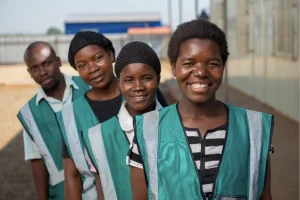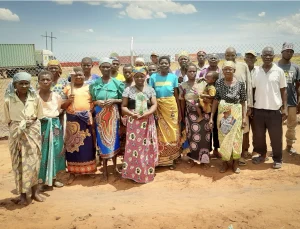How JCM Power Is Committing to the 2X Challenge and Addressing GBVH Head‑On (Dec 17, 2021)
The development of energy and infrastructure projects in developing countries, essential for the clean energy transition, often affects the social, economic, and political dynamics of nearby communities. Developers must proactively engage local communities—especially women—due to elevated risks of gender-based violence and harassment (GBVH), particularly during construction.
Why JCM Power Is Taking Action
JCM Power (JCM) strives to empower women through the development, construction, and operation of high-impact renewable energy projects in emerging markets. They integrate community engagement, job creation, training, and GBVH prevention and response for their staff, communities, and all stakeholders.
Meeting the 2X Challenge Criteria
As a Canadian independent power producer, JCM has set rigorous gender commitments:
-
30% of project companies must meet 2X criteria for female entrepreneurs, leaders, or employees within five years of development.
-
100% of project companies must have a gender equality management plan within 12 months of financial close.
-
They adopted a company-wide gender equality strategy by end of 2020.
-
Launched a 2X toolkit for project companies.
As a 2019 signatory to UN Women’s Empowerment Principles (WEPs), JCM also influences gender inclusion in projects where it is not the majority owner.
Implementing the Gender Action Plan
In 2020, JCM developed a multi-year Gender Action Plan with technical support from FinDev Canada, Swedfund, IFU, and FMO, and established an IDEA Committee (Inclusion, Diversity, Equality & Access) to steer implementation and accountability across the company.
They partnered with gender specialist consultants (Value for Women) to:
-
Design gender action plans for three projects,
-
Roll out gender-inclusive operational policies,
-
Launch initiatives advancing women in leadership and employment,
-
Provide gender mainstreaming trainings and toolkits,
-
Hire a Gender Inclusion Specialist (GIS) in Malawi,
-
Conduct a gender assessment in Pakistan operations.
jcmpower.ca+62X Challenge+6Impact Fund Denmark+6
 Responding to GBVH in Salima, Malawi
Responding to GBVH in Salima, Malawi
During the Salima Solar Plant construction in 2020, JCM addressed a GBVH allegation swiftly:
-
Commissioned an external GBVH consultant for rapid assessment,
-
Hired a Malawian Gender Inclusion Specialist (Grace Kaonga) to implement Salima’s Action Plan.Grace led initiatives across five priority areas:
-
Preventing project-related GBVH in the community,
-
Supporting GBVH survivors,
-
Preventing and responding to GBVH in the workplace,
-
Research, data collection, monitoring & evaluation.
2X Challenge+1jcmpower.ca+1jcmpower.ca+1jcmpower.ca+1
Building GBVH‑Smart Development
JCM commits to embedding gender risk management early, including customized baseline studies and tailored action plans during feasibility stages. They also strengthened survivor support and referral pathways in project areas.
A community member from Salima said:
“JCM has recruited gender personnel… they want to curb these [gender] problems. They are planning to participate in the 16 Days of activism… sensitize the community on all gender-based activities…”
jcmpower.ca+22X Challenge+2jcmpower.ca+2
Measurable Impact
While quantitative GBVH data remains challenging due to stigma and data gaps, JCM has achieved notable outcomes:
-
Increased incident reporting via trusted grievance mechanisms,
-
Improved case management through the presence of GIS,
-
Enhanced qualitative feedback and community confidence in GBVH response.
Broader Community & Economic Impact
From the Salima experience, JCM refined a two-pronged risk approach:
-
Preventing project-related GBVH,
-
Ensuring readiness to respond in workplace and community settings.
Complementing gender initiatives, JCM integrates community development programs aligned with their core impact pillars—climate change resilience, women’s economic empowerment, health & sanitation, sustainable livelihoods.
Their projects also drive foreign investment, local employment, and expanded access to clean energy, contributing to more inclusive prosperity.





